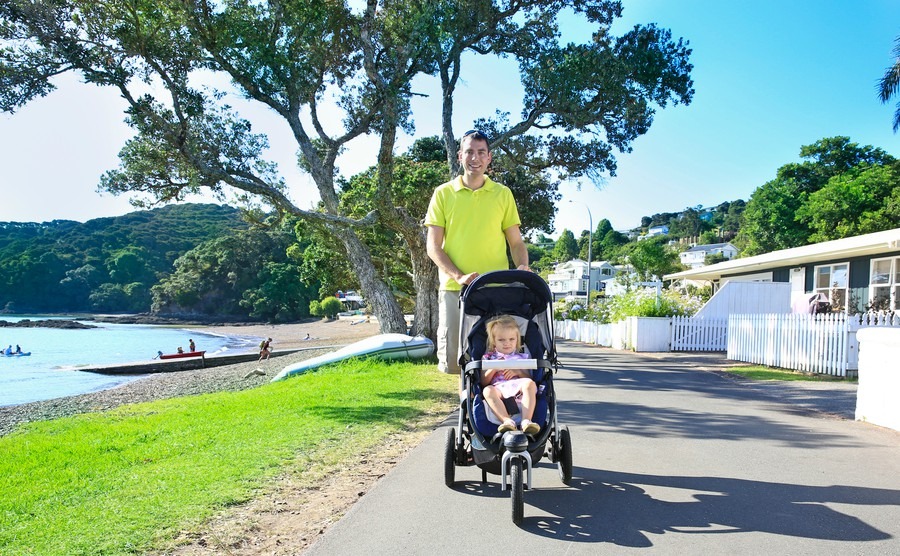It’s Father’s Day this weekend in the UK. You could be marking it in New Zealand next year, so how is fatherhood in New Zealand and what are your rights and responsibilities?
In New Zealand, Father’s Day falls a little later in the year – the first Sunday of September – so while we would love to give all our dad readers’ the chocolate orange they so richly deserve, instead we thought we’d look at what kind of paternity leave rights you’ll be entitled to once you make the move, and consider general attitudes towards both stay-at-home and traditional dads in New Zealand.
The average new build home in New Zealand is three times the size as in the UK, so at least you can get away from the kids!
Father’s Day, kiwi-style
Just because you’ve made the move to New Zealand doesn’t mean that you’ll be forced to tackle a new adrenaline sport each year. Unless that’s your thing, of course, or your wife is playing a mean trick on you! The day will usually be spent doing something that dad enjoys, but when you live in New Zealand, the options are wider than they may have been back in the UK. The greater range of outdoor activities includes bungee jumping, surfing, white water rafting or even skiing at this time of year.
If you want a quieter life, however, one of the best things about life in New Zealand is the large size of the houses. The average new build home is three times the size as in the UK, so at least you can get away from the kids!
As in the UK, Father’s Day is about showing appreciation for fathers and father figures. Talking about appreciating fathers, the government has shown some support, allowing new dads two weeks off work following the birth of a child or an adoption under the Parental Leave and Employment Protection Act 1987. The minimum requirements are:
1. That you have worked for the same employer in the previous six or 12 months before the baby’s expected due date (or from the first date that you become the primary carer for a child under six); and
2. You have worked for an average of at least 10 hours per week during that time.
The exact amount of unpaid parental leave you’re entitled to will depend on your individual situation, i.e. how many hours you work, how long you’ve worked for your employer, what was agreed in your employment contract. The best way to get the clearest picture of what you’re entitled to is to visit the website of the Ministry of Business, Innovation and Employment.

Every day is a happy Father’s Day in the wide open spaces of New Zealand
Paid parental leave
If you are eligible for paid parental leave in New Zealand, you can secure government-funded ‘parental leave payments’. It is possible to transfer this payment from one parent to another as long as both are eligible for the parental leave payments. The period in which one parent can receive these payments was increased in April 2016 from 16 weeks to 18 weeks. When these amendments were made, the law was also widened to include non-standard workers (i.e. casual, seasonal, employees with more than one employer). It is worth bearing in mind that if you’re not eligible for the payments, you may still be able to secure the parental tax credit, so don’t forget to investigate that. The best way to work out whether or not you will be eligible for paid parental leave is to consult your employer, and to contact the Ministry of Business, Innovation and Employment. The payment you receive will either be your usual gross weekly rate of pay, or your average weekly earnings if you are self-employed. If you’re planning to start a family, or to have more children when you arrive in New Zealand, bear this in mind when negotiating your employment contract; many employers offer their staff better-than-standard packages.
The number of stay-at-home dads is growing in New Zealand, like in many countries, as the roles of both men and women change with new technology and equality
Visit New Zealand’s Citizen’s Advice Bureau to discover what other types of financial assistance is available to new parents in New Zealand.
Househusbands in New Zealand
The number of stay-at-home dads is growing in New Zealand, like in many countries, as the roles of both men and women change with new technology and equality. Of course that’s all very nice in theory, but men with a nappy to change will still often find themselves struggling for options outside a ladies’ bathroom. Look for a “Parents Rooms”, which allows access to both parents. One useful service is Father&Child.org.nz, which aims to encourage happy families and fathers, offering tips and advice on modern parenting.

Get all of the key information and advice you need in our online guide to buying a house in New Zealand. You can also download it in PDF format for offline reading or printing. Fill in the form to the right to get your copy.






